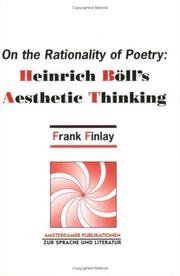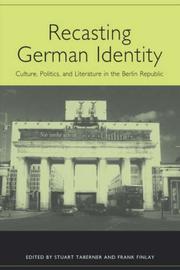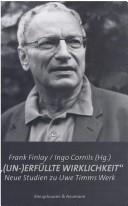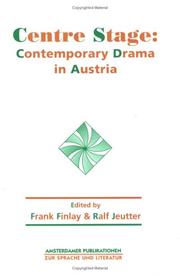| Listing 1 - 10 of 15 | << page >> |
Sort by
|
Book
Year: 2002 Publisher: Oxford: Blackwell,
Abstract | Keywords | Export | Availability | Bookmark
 Loading...
Loading...Choose an application
- Reference Manager
- EndNote
- RefWorks (Direct export to RefWorks)

ISBN: 9051839898 Year: 1996 Publisher: Amsterdam ; Atlanta Rodopi
Abstract | Keywords | Export | Availability | Bookmark
 Loading...
Loading...Choose an application
- Reference Manager
- EndNote
- RefWorks (Direct export to RefWorks)

ISBN: 9004654674 9051839898 Year: 1996 Publisher: Boston : BRILL,
Abstract | Keywords | Export | Availability | Bookmark
 Loading...
Loading...Choose an application
- Reference Manager
- EndNote
- RefWorks (Direct export to RefWorks)
This study explores Heinrich Böll's 'aesthetic thinking', as it is expressed in the author's disparate and voluminous writings on literature. Böll's work in this field is situated in the multi-faceted context of social, political, and cultural developments in post-war Germany, and is shown to be an important adjunct to the novels and stories which were honoured with the Nobel Prize for Literature. An understanding of Heinrich Böll's 'aesthetic thinking' can illuminate the writer's fiction in an intriguing way. In particular, Böll's defence of the 'rationality of poetry' raises issues which reverberate in continuing debates on the social validity of literature.
German literature. --- Aesthetics, German. --- German literature --- Aesthetics, German
Book
ISBN: 9789004654679 9789051839890 Year: 1996 Publisher: Leiden ;Boston Brill
Abstract | Keywords | Export | Availability | Bookmark
 Loading...
Loading...Choose an application
- Reference Manager
- EndNote
- RefWorks (Direct export to RefWorks)

ISBN: 1571132449 1571136088 Year: 2002 Publisher: Rochester, NY : Camden House,
Abstract | Keywords | Export | Availability | Bookmark
 Loading...
Loading...Choose an application
- Reference Manager
- EndNote
- RefWorks (Direct export to RefWorks)
This collection of fifteen essays by scholars from the UK, the US, Germany, and Scandinavia revisits the question of German identity. Unlike previous books on this topic, however, the focus is not exclusively on national identity in the aftermath of Hitler. Instead, the concentration is upon the plurality of ethnic, sexual, political, geographical, and cultural identities in modern Germany, and on their often fragmentary nature as the country struggles with the challenges of unification and international developments such as globalization, multiculturalism, and postmodernism. The multifaceted nature of German identity demands a variety of approaches: thus the essays are interdisciplinary, drawing upon historical, sociological, and literary sources. They are organized with reference to three distinct sections: Berlin, Political Formations, and Difference; yet at the same time they illuminate one another across the volume, offering a nuanced understanding of the complex question of identity in today's Germany. Topics include the new self-understanding of the Berlin Republic, Berlin as a public showcase, the Berlin architecture debate, the Walser-Bubis debate, fictions of German history and the end of the GDR, the impact of the German student movement on the FRG, Prime Minister Biedenkopf and the myth of Saxon identity, women in post-1989 Germany, trains as symbols and the function of the foreign in post-1989 fiction, identity construction among Turks in Germany and Turkish self-representation in post-1989 fiction, the state of German literature today. Contributors: Frank Brunssen, Ulrike Zitzlsperger Janet Stewart, Kathrin Schödel, Karen Leeder, Ingo Cornils, Peter Thompson, Chris Szejnmann, Sabine Lang, Simon Ward, Roswitha Skare, Eva Kolinsky, Margaret Littler, Katharina Gerstenberger, and Stuart Parkes. Stuart Taberner is Lecturer in German, and Frank Finlay is Professor of German and Head of the Department of German, both at the University of Leeds, UK.
German literature --- Holocaust, Jewish (1939-1945) --- National characteristics, German. --- History and criticism. --- Psychological aspects. --- Germany --- Intellectual life --- Ethnic relations. --- Prison psychology --- German national characteristics --- Berlin Architecture. --- Berlin Republic. --- Cultural Identity. --- Ethnic Identity. --- German History. --- German Identity. --- German Literature. --- German Student Movement. --- National Identity. --- Political Identity. --- Turkish Self-representation.

ISBN: 3826032446 Year: 2006 Publisher: Würzburg : Königshausen und Neumann,
Abstract | Keywords | Export | Availability | Bookmark
 Loading...
Loading...Choose an application
- Reference Manager
- EndNote
- RefWorks (Direct export to RefWorks)
Book
ISBN: 9783034301565 3034301561 Year: 2010 Publisher: Oxford : Lang,
Abstract | Keywords | Export | Availability | Bookmark
 Loading...
Loading...Choose an application
- Reference Manager
- EndNote
- RefWorks (Direct export to RefWorks)
The contributors address a range of issues, including the controversial building of a mosque in Cologne & pressure experienced by German Jews to reconnect with a religion that their forebears cast off sometimes more than a century ago.
Religion. --- 2000-2099. --- Germany --- Germany. --- Religion

ISBN: 9781571136084 9781571132444 Year: 2002 Publisher: Suffolk Boydell & Brewer
Abstract | Keywords | Export | Availability | Bookmark
 Loading...
Loading...Choose an application
- Reference Manager
- EndNote
- RefWorks (Direct export to RefWorks)
Book
Abstract | Keywords | Export | Availability | Bookmark
 Loading...
Loading...Choose an application
- Reference Manager
- EndNote
- RefWorks (Direct export to RefWorks)

ISBN: 9004654941 9042005254 Year: 1999 Publisher: Amsterdam : BRILL,
Abstract | Keywords | Export | Availability | Bookmark
 Loading...
Loading...Choose an application
- Reference Manager
- EndNote
- RefWorks (Direct export to RefWorks)
In this volume, scholars and theatre practioners from Austria, Britain and Germany explore the current state of Austrian drama in studies of the themes, forms and concerns of some of the most important contemporary playwrights. Many of the contributions address works which have not previously been the subject of scholarly analysis. The writers discussed include: Wolfgang Bauer, Thomas Bernhard, Elias Canetti, Peter Handke, Fritz Hochwälder, Elfriede Jelinek, Jakov Lind, Felix Mitterer, Hermann Nitsch, Gerhard Roth, Werner Schwab, Marlene Steeruwitz, Peter Turrini, and the film-maker, Wim Wenders. This collection, which includes photographs and an essay on the problems of translating, will be of particular interest to teachers, students and translators of German-language drama, as well as to a wider theatre-going public.
| Listing 1 - 10 of 15 | << page >> |
Sort by
|

 Search
Search Feedback
Feedback About UniCat
About UniCat  Help
Help News
News